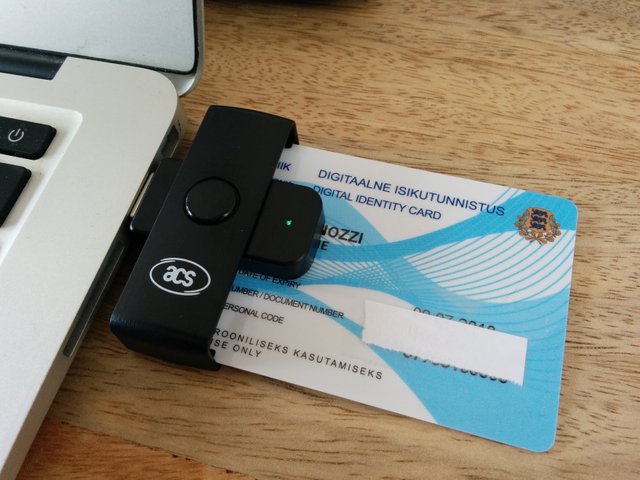The Success of Digital Identities in Estonia Shine Light On What Is Possible Through Blockchain Technology
Estonia is considered to be the world leader of digital government, and the benefits that have come with digital governance are clear.
After gaining independence in 1991 from the former Soviet Union, the baltic country of Estonia decided to take a new approach to government. With a total population of only 1.3 million people, Estonia ranks second of all countries on the social progress index for personal and political rights. The Estonian government has transformed its government to one of the most efficient in the whole world. There are numerous ways things that led to this, but all programs are focused around connectivity and access for everyone. Over 98% of the country's annual banking transactions are conducted online, as well as 95% of the countries taxes. The implementation of digital identities for every individual within society has allowed for unparalleled government efficiency and transparency.
What can the citizen's digital identities be used for?
An individual's digital ID can be used for nearly all transactions within the country, whether that be banking, taking public transport, medical record, ect. The success and popularity of the digital ID's are evident considering over 95% of Estonian citizens have a digital ID. The digital identities are available online, on mobile devices and through a physical card. The physical ID card is embedded with the individual's unique digital signature to verify and authenticate their identity, as well as requiring a personal PIN number of their choice. Instead of having to purchase ina ticket to board a subway, an individual would simply scan their card which would automatically transfer the necessary funds. Estonia introduced digital voting in 2005, and during the 2014 election over one third of ballots were submitted electronically. This enabled individuals to vote even if they were traveling in another part of the EU, or simply wanted to streamline the voting process by submitting a ballot digitally.
Digital identities allow for larger percentage of people to have economic involvement.
With the implementation of a trustworthy digital identity, an individual who lives 100 miles from the nearest branch of their bank has the same access to financial services as an individual who lives right next to the bank. One of the hardest problems many digital payment systems face is the infrastructure needed to service the mobile payments, but when banking and government systems are established with digital identities in mind the possibilities are truly limitless. With 98% of banking transactions happen digitally there is a very minimal need for individuals to turn money in their bank account into fiat currency, there is no need for extensive infrastructure isn't required to service the digital payments. The ability for all citizens to participate in the voting process regardless of their means or location has huge positive benefits of keeping the government elections totally democratic.
Estonia the first country to establish a successful completely digital land registry.
The electronic nature of the land registry in Estonia has huge benefits for home buyers, sellers, and real estate firms. The process to transfer land in Estonia has been streamlined within Estonia, and property transfers take just over a week compared to the traditional period of around 3 months. The registry is decentralized, meaning that it is not housed on a single computer but rather distributed throughout many. All land transfers are publically accessible and can never be altered by any individual. Although this may not seem like a huge issue for individuals in the US, having verifiable proof that you own a piece of property is absolutely essential in most parts of the world. Many governments around the globe attempt to unlawfully seize individuals' land.If individuals are able to maintain distributed digital proof of their ownership, then it would make it much harder for governments to get away with this type of behavior.
Through the formation of a digital ID, all of the individual's data from all aspects of life are found in one central location.
That is not to say that all of the information is stored in a single location, because as we have discussed the ID's work using distributed technology. It is completely up to the individual who has access to their information, similar to individuals giving consents for doctors to discuss their medical history or record with anyone else. Estonia has managed to digitalize nearly all of the traditional government functions, such as applying for business licenses, applying for social security, or reporting incidents to authorities. It takes an individual around 20 minutes to go through the process of applying and receiving a business license, which is the fastest of any country in the world. This eliminates the need for lawyers and middlemen for individuals wishing to start a business, file their taxes, apply for a patent, ect.
This quick video is an awesome explanation of just how success a digital system has been in Estonia.
<iframe width="560" height="315" src="
video source
Estonia realized how important a transparent and trustless government model is to the success of a society as a whole.
The Estonian court system operates in such a way that every draft of legislation is available and recorded to everyone online. This makes it impossible for the government to try to take any coercive actions against its people. Estonia realized very early just how vital cybersecurity was going to be to their use of digital IDs, and implemented a system for the IDs to run on a keyless signature infrastructure or KSI. This type of infrastructure allows transactions and data to be validated without the use of cryptographic keys or centralized institutions, but rather through the use of algorithms. This means that even if an individual was trying to steal another's identity or money, the individual would also need the individual's unique card and PIN code.
Both parties in a transaction have the ability to instantly and seamlessly verify the identity of their counterpart through their specific digital ID. Similarly to many other blockchain based systems, the parties don't even need to necessarily know who they are dealing with, they simply need to know that their counterpart has a history of integrity and honesty. The use of digital IDs unlock so much potential for a society, but especially for the lower income members of a society. The efficiency in Estonia's system lowers the barrier to entry into many different fields for all individuals within society, regardless of their means or resources. There is also a reduced amount of identity fraud and other cyber crimes in Estonia compared to other parts of the world, which is likely in a large part due to their extensive and reliable verification system.
I don't know about you, but this sure seems like this is the way the world is headed. Estonia has had a direct advantage because of their small size, history, and establishment during the technology boom.
I hope you enjoyed this post and please leave any comments you have below! If you enjoyed this post please consider giving me a follow to see other related content! Thanks for reading!
sources: http://www.economist.com/blogs/economist-explains/2013/07/economist-explains-21
Blockchain Revolution By: Don and Alex Tapscott


It sure does look that way.
The Biometric ID Grid: A Country-by-Country Guide
https://www.corbettreport.com/the-biometric-id-grid-a-country-by-country-guide/